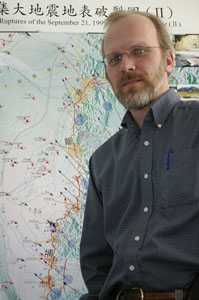Geology professor to speak about Utah resources in ‘Last Lecture’
The students have spoken and chosen the speaker for this year’s “Last Lecture.”
Geology professor Jim Evans was chosen by Utah State University Honors students to be the speaker at the 30th annual “Last Lecture,” Katherine Shakespeare, a student adviser of the USU Honors Program, said. The lecture will be given at 12:30 p.m. April 14 in the Taggart Student Center Ballroom. It is unique because the focus is completely on the wants and needs of the students, Shakespeare said.
At the end of fall semester, Honors students are allowed to nominate teachers who have had a positive impact on students’ lives in and outside of the classroom.
A committee of Honors students then reviews the nominations and narrows down the candidates to a more manageable number. Finalists are then interviewed by the committee of Honors students. The committee the picks the “Last Lecturer” from the group of finalists, Shakespeare said.
“Dr. Evans stood out to us because he clearly has a very active interest in the success of his students. His topic of choice also left a very lasting impression on us as a committee and we were eager to hear the ‘full-length’ version,” Shakespeare said.
Evans said he enjoyed the interview because “professors don’t get put on the spot enough.” The committee asked Evans a variety of questions ranging from what brought him to the university, what he has learned at USU and what advice he would give to students if given the opportunity.
The idea of the lecture is for it to be given as if it were the last lecture ever to be given by the chosen professor and thus an opportunity to speak on an important topic or give advice and wisdom, Evans said.
“It’s a pretty big honor,” he said. “I’m getting a little nervous.”
The title of Evans’ lecture is “Utah 2050: Of Oil, Milk and Water in a Land of Plenty [of People].”
Evans plans to talk about the predictions that in 2050 about 5.5 million people will live in Utah and what that means for decisions that will need to be made. About 2.2 million people currently live in Utah. Those still living in Utah in 2050 will have to deal with issues such as the drought cycle, air quality and land available for housing and development that will be drastically affected by the larger population.
Evans said he hopes the lecture will educate students about the future and the choices they will be faced with because students have not been taught sufficiently. However, he does not want the lecture to sound gloomy.
“Americans make it work in the end even if the process is ugly,” Evans said.
Evans has been teaching at USU for about 18 years and has loved it, he said. This year, he taught the Honors class, “Planet Earth,” and enjoyed helping his students understand different perspectives.
Last semester, Evans held a special evening class with an air quality specialist. Students were each given a different role to play ranging from a liberal who believes the environment should be more protected and controlled to a grumpy old man who has lived in the valley forever and doesn’t like change.
Evans “Last Lecture” topic was partly inspired by a group of his Honors students this year who studied weather patterns in the St. George area and how the amount of precipitation received yearly differs greatly from year to year.
It is predicted that in 2050 600,000 people will live in St. George and Evans said there has to be a plan to handle the drought cycle.
-hilaryi@cc.usu.edu

